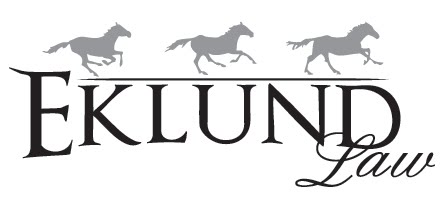Bankruptcies and home foreclosures have risen in the last
few years, and so has concern over allegations of abuse and neglect of
animals. A few widely publicized
investigations into horrific allegations of starved and neglected horses have
both animal welfare advocates and horse farm owners wondering: in Minnesota, where
does the law draw the line between farm owners' property rights and the
authority of investigating officers or law enforcement to enter the property
and remove animals?
What happens in an
investigation?
In Minnesota, authority to investigate allegations of animal
cruelty and neglect is vested by statute, Minn. Stat. § 343.01, in a private nonprofit organization
called Minnesota Federated Humane Societies (also known simply as "the
Federation"). The purpose of the
Federation is “to assist in the enforcement of the laws for the prevention of
wrongs to animals; to assist in the organization of district and county
societies and give them representation in the state federation; to aid such
societies and agents in the enforcement of the laws for the prevention of
wrongs to animals which may now or hereafter exist, and to promote the growth
of education and sentiment favorable to the protection of animals.” Minn. Stat. § 343.06. Persons who believe unlawful abuse or neglect
is occurring may call a toll-free number and leave a message describing the
situation and exact location. A
certified investigating officer would then follow up with the caller and, if
appropriate, commence an investigation into the alleged mistreatment.
According to the Federation, about 100 officers operating in
all 87 Minnesota counties have certification as humane agents that authorizes
them to investigate allegations of animal cruelty and neglect. In certification training, agents are taught
how to conduct investigations in cooperation with law enforcement and in accordance
with State statutes regulating Federated and describing care standards for
various animals.
Horses and other equines have their own care standard
statute in the Pet and Companion Animal Welfare Act, Minn. Stat. § 346.38, which
mandates a minimum standard for food, water, and shelter. Other chapters contain additional
prohibitions, such as docking a horse’s tail, which is prohibited under Minn.
Stat. § 343.25, a section of the chapter in Minnesota Statutes dedicated to
prevention of cruelty to animals.
A Federated agent arriving at a property to investigate must
carry an ID card with the agent's name and the expiration date of the one-year
term of authorization. Agents typically
will also be identifiable by wearing a Federated jacket, although some agents
also are law enforcement officers, veterinarians, or other professionals whose
attire is specific to their primary occupation.
If the property owner cooperates with the agent, the
investigation may consist only of a walk-through of the property to confirm the
presence of adequately treated and fed horses and availability of food and
water. If concerns about mistreatment
are raised during the inspection, the Federated agent's first objective is to
work with the owner to correct the problems.
This might involve scheduling veterinarian visits and further
inspections to ensure adequate progress and compliance. According to Federated, obtaining a warrant
to remove animals is considered a last resort; educating owners in proper care
standards to improve animal stewardship practices is always the preferred means
to protect animals from neglect.
What if the property
owner is absent or won't cooperate when a Federated humane agent arrives?
Federated humane agents are authorized to investigate animal
abuse allegations, but that authority does not trump a property owner's
Constitutional rights against search and seizure of property without a Court
warrant. Therefore, neither the
Federated humane agent nor law enforcement may enter property without the
owner's consent, or a warrant.
If the property owner is not home when the agent arrives,
typically a door hanger notice is left behind explaining the reason for the
visit and providing contact information so the owner can call back to discuss
the situation and participate voluntarily in the investigation.
If the owner does not cooperate with the investigation,
agents must investigate using other means to obtain enough information to show
"probable cause" that a crime has occurred before a warrant from the
court may be issued. Neighbors or other
potential witnesses may be contacted about the condition of animals on the
property in question. If a court, upon affidavit
of the agent, determines that probable cause exists, then a warrant will issue
that authorizes the agent—together with law enforcement and other persons such
as a veterinarian, depending on the circumstances—to enter the property without
the owner's consent. Only the animals
listed in the warrant or which meet the criteria stated in the warrant may be
removed.
Once a warrant is executed, the owner has ten days to
petition the Court for the return of any animals removed. During that ten-day period, the horses will
typically be placed in temporary adoptive homes or with a rescue organization,
although in some cases horses may remain on the property and rescue workers
will be authorized to enter the property to care for the animals. Ownership of the horses cannot be lawfully
transferred until the end of the 10-day period, but a licensed veterinarian may
euthanize animals during that time if deemed appropriate in the vet's
professional judgment.
Owners may then be charged with criminal citations of abuse
or neglect as merited by the results of the investigation.
For more information or to report suspected abuse of animals,
call Federated at 1-877-8ANIMAL (1-877-826-4625) or visit its web site at http://humanesocieties.net/. Minnesota Statutes may be searched and viewed
online at the Legislature’s Office of the Revisor of Statutes, https://www.revisor.mn.gov/pubs/, If you have legal questions about your own situation,
consult an attorney.
Allison F. Eklund, M.A., J.D.
Eklund Law, PC
(651) 592-7858
*Special thanks to Timothy J. Shields, attorney for
Minnesota Federated Humane Societies, for contributing to this article.
